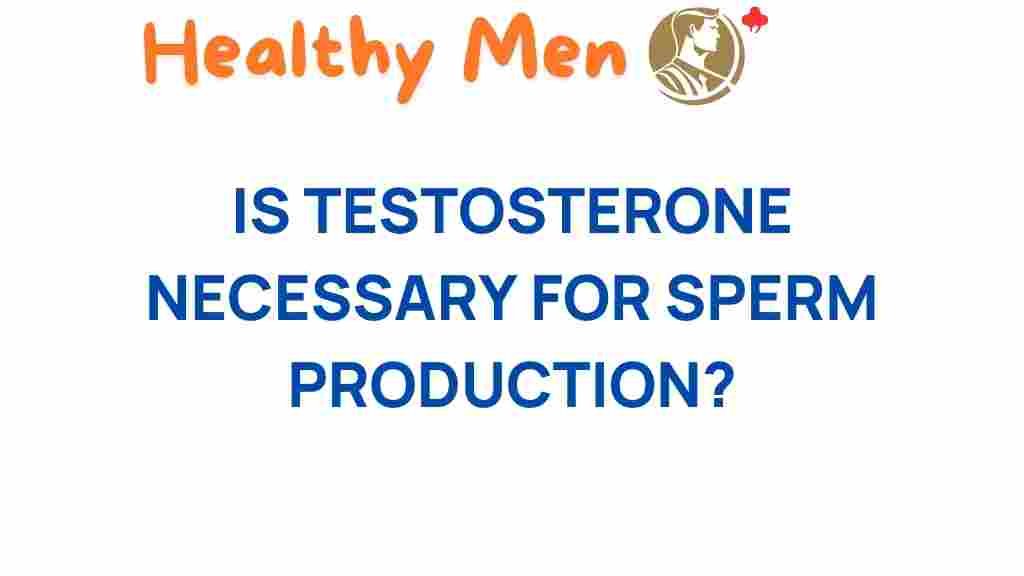Unraveling the Mystery: Is Testosterone Essential for Sperm Production?
In the realm of male reproductive health, testosterone plays a pivotal role. Understanding its impact on sperm production and overall male fertility is essential for those experiencing fertility issues. In this article, we will explore the relationship between testosterone, sperm production, and hormonal balance, shedding light on how these factors intertwine within the endocrine system.
The Role of Testosterone in Male Fertility
Testosterone, primarily produced in the testes, is the key hormone responsible for the development of male reproductive tissues and the maintenance of secondary sexual characteristics. But its influence extends far beyond these functions, particularly in:
- Sperm Production: Testosterone is crucial for the process of spermatogenesis, where sperm cells are produced in the testes.
- Libido: This hormone affects sexual drive, an essential aspect of reproductive health.
- Muscle Mass and Strength: Testosterone contributes to muscle development, which can indirectly affect overall health and fertility.
How Testosterone Levels Affect Sperm Health
Testosterone levels can vary significantly among men, and these variations can have profound effects on sperm health:
- Low Testosterone Levels: Low levels of testosterone can lead to decreased sperm production, resulting in infertility.
- High Testosterone Levels: Excess testosterone, often seen in those using anabolic steroids, can disrupt the hormonal balance, further impacting sperm production.
Maintaining optimal testosterone levels is therefore essential for healthy sperm production and overall male fertility.
The Endocrine System and Hormone Balance
The endocrine system regulates hormones, including testosterone, which are vital for reproductive health. Hormonal balance is crucial as it affects:
- Testosterone Production: The hypothalamus and pituitary gland play significant roles in regulating testosterone production through the release of gonadotropins (LH and FSH).
- Thyroid Function: Thyroid hormones also influence testosterone levels and overall metabolism.
- Insulin Sensitivity: Insulin resistance can negatively impact testosterone production and sperm health.
Any disruptions in this delicate system can lead to fertility issues, emphasizing the importance of maintaining hormone balance for reproductive health.
Fertility Issues Linked to Low Testosterone Levels
Low testosterone levels can lead to several fertility issues, including:
- Oligospermia: A condition characterized by a low sperm count.
- Azoospermia: Absence of sperm in the ejaculate, making natural conception impossible.
- Poor Sperm Motility: Reduced ability of sperm to swim effectively, hindering the chances of fertilization.
Understanding these conditions can help men recognize the signs of low testosterone and seek appropriate interventions.
Step-by-Step Process: How to Assess Testosterone Levels
If you suspect that low testosterone may be affecting your sperm production, it’s essential to assess your testosterone levels. Here’s a step-by-step process:
- Consult a Healthcare Provider: Schedule an appointment with a doctor who specializes in male fertility or endocrinology.
- Blood Tests: Request blood tests that measure total and free testosterone levels, along with other relevant hormones such as LH and FSH.
- Evaluate Symptoms: Discuss any symptoms you may be experiencing, such as decreased libido, fatigue, or changes in mood.
- Consider Additional Testing: Depending on the results, further tests such as semen analysis may be recommended to assess sperm health.
Improving Testosterone Levels and Sperm Production
Once you have assessed your testosterone levels, there are several strategies you can implement to improve them and boost sperm production:
- Maintain a Healthy Weight: Obesity can negatively impact testosterone levels. A balanced diet and regular exercise can help.
- Exercise Regularly: Strength training and cardiovascular exercise have been shown to increase testosterone production.
- Avoid Stress: Chronic stress elevates cortisol levels, which can inhibit testosterone production.
- Optimize Sleep: Aim for 7-9 hours of quality sleep per night to support hormone balance.
- Limit Alcohol and Drug Use: Excessive alcohol and recreational drugs can lower testosterone levels.
- Consider Supplements: Supplements such as zinc, vitamin D, and omega-3 fatty acids may support testosterone levels.
Implementing these lifestyle changes can contribute to a healthier hormonal environment conducive to improved sperm health.
Troubleshooting Tips for Low Testosterone and Sperm Production
If you’re still experiencing fertility issues despite making lifestyle changes, consider the following troubleshooting tips:
- Follow-Up Testing: Repeat testosterone and semen analyses after a few months to monitor changes.
- Consult a Specialist: If low testosterone persists, consider consulting an endocrinologist or reproductive specialist.
- Explore Medical Treatments: Discuss with your doctor the possibility of testosterone replacement therapy if low testosterone is confirmed.
- Address Underlying Medical Conditions: Conditions such as diabetes or hormonal disorders may require treatment to restore hormone balance.
Conclusion
Testosterone is indeed essential for sperm production and plays a crucial role in male fertility. Understanding the relationship between testosterone levels, sperm health, and hormonal balance can empower men to take charge of their reproductive health. If you’re facing fertility issues, consider taking proactive steps to assess and optimize your testosterone levels.
For more information on male reproductive health and hormone balance, check out this comprehensive guide on hormones and fertility. Remember, maintaining a healthy lifestyle and seeking professional help when needed can lead to significant improvements in fertility outcomes.
By unraveling the mystery of testosterone and its vital role in sperm production, men can make informed decisions that promote their reproductive health and overall well-being.
This article is in the category Conditions and created by healthymen Team
